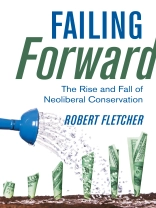Failing Forward documents the global rise of neoliberal conservation as a response to biodiversity loss and unpacks how this approach has managed to ’fail forward’ over time despite its ineffectiveness. At its core, neoliberal conservation promotes market-based instruments intended to reconcile environmental preservation and economic development by harnessing preservation itself as the source of both conservation finance and capital accumulation more generally. Robert Fletcher describes how this project has developed over the past several decades along with the expanding network of organizations and actors that have come together around its promotion. Drawing on Lacanian psychoanalysis, he explores why this strategy continues to captivate states, nongovernmental organizations, international financial institutions, and the private sector alike despite its significant deficiencies. Ultimately, Fletcher contends, neoliberal conservation should be understood as a failed attempt to render global capitalism sustainable in the face of its intensifying social and ecological contradictions. Consequently, the only viable alternative capable of simultaneously achieving both environmental sustainability and social equity is a concerted program of ’degrowth’ grounded in post-capitalist principles.
Innehållsförteckning
Contents
List of Illustrations
Acknowledgments
Abbreviations
Introduction: Capitalism on Trial
1 • Conceptualizing Neoliberal Biopower
2 • Conjuring Natural Capital
3 • Imagining the Market
4 • The Neoliberal Ecolaboratory
5 • The Anti-regulation Machine
6 • How to Fail Forward
7 • Neoliberal Conservation in Ruins?
8 • There Is No Alternative to Degrowth
Conclusion: Traversing the Neoliberal Fantasy
Notes
Bibliography
Index
Om författaren
Robert Fletcher is Associate Professor of Sociology of Development and Change at Wageningen University. He is the author of Romancing the Wild: Cultural Dimensions of Ecotourism and a coauthor of The Conservation Revolution: Radical Ideas for Saving Nature beyond the Anthropocene.












